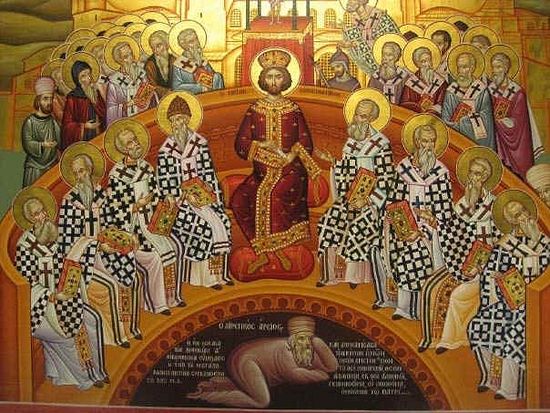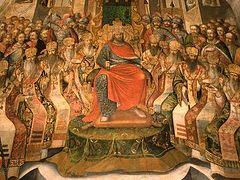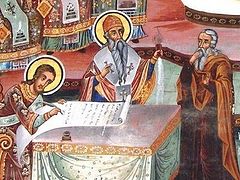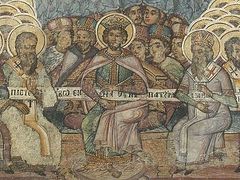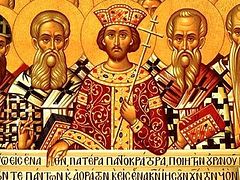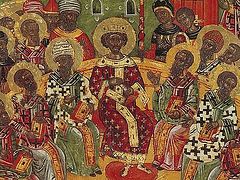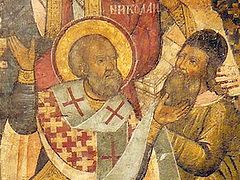This past Sunday, the 7th after Pascha, we commemorated the Holy Fathers of the 1st Ecumenical Council as is the practice in Orthodoxy these days. We might ask ourselves what exactly can we take from that Council that we need to teach today? While to some the issues of the Council might seem like purely academic debates about abstract theology, the debate of that Council touches the very heart of what and who we understand God to be. The Council is about God, and it is about the confessional and dogmatic theology of biblical Judaism. The Council focused on Deuteronomy 6 and how we Christians interpret the central tenet of our Old Testament Scriptures. Here is an excerpt from that passage that gives us the central point (emphases in the text is mine):
Now this is the commandment—the statutes and the ordinances—that the LORD your God charged me to teach you to observe . . . so that you and your children and your children’s children may fear the LORD your God all the days of your life, and keep all his decrees and his commandments that I am commanding you, so that your days may be long. . . .
Hear, O Israel: The LORD is our God, the LORD is one. You shall love the LORD your God with all your heart, and with all your soul, and with all your might. Keep these words that I am commanding you today in your heart. Recite them to your children and talk about them when you are at home and when you are away, when you lie down and when you rise. . . . and when you have eaten your fill, take care that you do not forget the LORD, who brought you out of the land of Egypt, out of the house of slavery. The LORD your God you shall fear; him you shall serve, and by his name alone you shall swear. Do not follow other gods, any of the gods of the peoples who are all around you . . . When your children ask you in time to come, “What is the meaning of the decrees and the statutes and the ordinances that the LORD our God has commanded you?” then you shall say to your children, “We were Pharaoh’s slaves in Egypt, but the LORD brought us out of Egypt with a mighty hand. The LORD displayed before our eyes great and awesome signs and wonders against Egypt, against Pharaoh and all his household. He brought us out from there in order to bring us in, to give us the land that he promised on oath to our ancestors. Then the LORD commanded us to observe all these statutes, to fear the LORD our God, for our lasting good, so as to keep us alive, as is now the case. If we diligently observe this entire commandment before the LORD our God, as he has commanded us, we will be in the right.”
Deuteronomy 6 which contains the Shema of Israel, the central tenet of Judaism which our Lord Jesus Christ Himself taught.
And one of the scribes came up and heard them disputing with one another, and seeing that he answered them well, asked him, “Which commandment is the first of all?” Jesus answered, “The first is, ‘Hear, O Israel: The Lord our God, the Lord is one; and you shall love the Lord your God with all your heart, and with all your soul, and with all your mind, and with all your strength.’ The second is this, ‘You shall love your neighbor as yourself.’ There is no other commandment greater than these.” And the scribe said to him, “You are right, Teacher; you have truly said that he is one, and there is no other but he; and to love him with all the heart, and with all the understanding, and with all the strength, and to love one’s neighbor as oneself, is much more than all whole burnt offerings and sacrifices.” And when Jesus saw that he answered wisely, he said to him, “You are not far from the kingdom of God.” And after that no one dared to ask him any question. (Mark 12:28-34)
The truth of theology, the truth of the ecumenical councils and the truth of the bible are the same truth. Deuteronomy 6 gives the basic theology tenet of Judaism and Christianity in the form of the greatest commandment. We are to preach and teach to our flocks the decisions of the 1st Ecumenical Council precisely because they are our understanding of Deuteronomy 6, of the Shema of Israel, of God Himself. And as is clear in Deuteronomy 6, it is the duty of God’s people to teach this true theology to our children and grandchildren. Not only does Deuteronomy 6 teach theology, it commands religious education! We are to influence, to shape and to form the theological experience and understanding of our membership and our families and children. Ecumenical Councils were debating theology, but not just for academics, but for every man, woman and child of the Church. We are to teach and preach in evangelism, in apologetics and in education – portraying God as God chose to reveal Himself, and in defending the very way and words we use to explain God.

